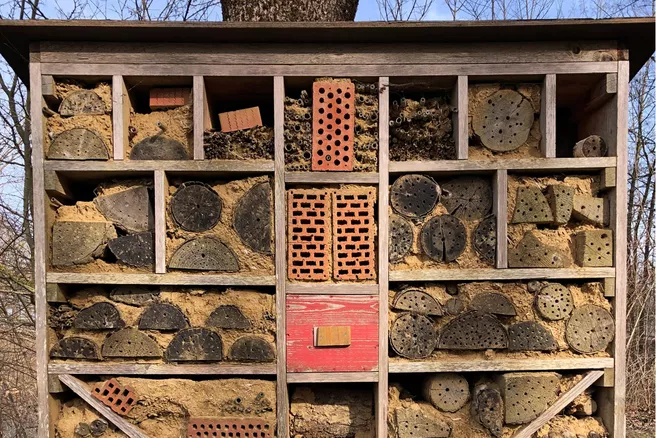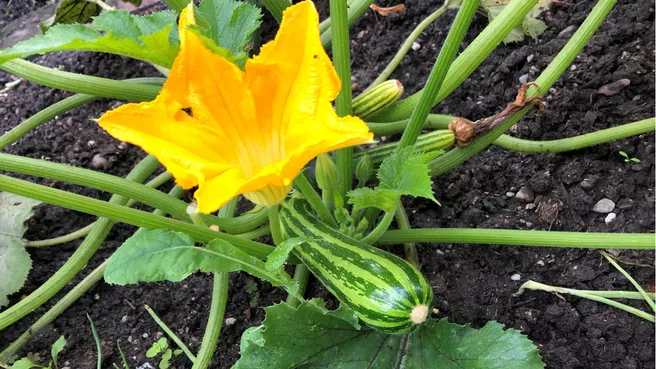By way of joint projects the Green Office aims to build a community and make the campus more sustainable. Employees in the Green Office provide information on sustainability topics, establishing a network to connect protagonists and supporters by gathering ideas and promoting projects geared to making the campus “greener” and more sustainable.
Existing sustainability projects highlighted
“We want to create a better network on the campus for existing student initiatives relating to sustainability and establish a connection to HSWT students,” states Nutritional Science student Sofia Schwarz, one of the three student managers of TUM’s Weihenstephan Green Office.
Since October, for example, the three students, Tsveta Davidkova, Sofia Schwarz and Lisa Thuro, have already identified numerous “sustainable locations” on the campus and brought them to the community’s attention. “At the Student Union’s information stand in the canteen, students can buy “StuBowls”. They can take away a warm meal in their bowl. There’s a “Fairteiler” (“Fair distributor”) foodsharing distribution point at the student union for anyone wishing to save food that supermarkets would have thrown away due to best before dates,” explains Biology student Tsveta Davidkova, citing examples for such locations.
The students have set up new raised beds on the campus. “This a joint project together with the “Plant a Seed” student initiative and it’s a great participation project as everybody is invited to help with the gardening”, says Lisa Thuro. “Anyone interested in joining in is welcome to contact us!” In future, the intention is also to offer an option to write theses revolving around the raised beds in various faculties, e.g., on plant growth and fruit production or how insects local to the campus use the plants. “In this way, we can make a direct connection between research and life on the campus”, as Tsveta Davidkova enthuses with keen anticipation.
Ideas competition for greater sustainability
As a first major project, the Green Office in Freising organized an ideas competition. “Altogether there were 27 submissions from a wide variety of groups on different topics”, as Lisa Thuro, who is studying Sustainable Resource Management, informed. The winners were recently crowned.
First place went to the project entitled “TUM Bee Paradise – improved habitat for wild bees & information campaign”. This project is also set to be put into practice soon. With the TUM Bee Paradise, the winning team would like to reach nature lovers, passers-by and the broader public and inform them about wild bees. “To do so, information boards are to be created, for example, on the habitat the bees require, the variety of flowers and the bee species found here”, states Susanne Butschkau who submitted the idea as the team leader. “We also want to help the local wild bee populations by providing nest material and flowering areas at three selected locations on the campus with the aid of seed mixtures”, explains Dr. Maria Alejandra Parreño who developed the idea for the project together with her colleague Kenneth Kuba at the Chair for Plant-Insect Interactions.
The Climate Trail project won second place. “The aim of the project is to set up a climate trail with various stations on the Life Sciences campus in Weihenstephan, connected by a common thread”, states Maike Limmer, one of the project initiators from the six-strong team. The stations are to contain 14 topics of relevance to the climate. “At three of the stations, we would also like to promote and demonstrate positive initiatives for the climate”, says Lena Garmaier from the student project team. In this way, the Climate Trail could inform, educate and facilitate positive climate action for many individuals, thereby contributing to a climate-positive, more sustainable campus and city.
The idea of a system for collecting organic waste on the campus – primarily in the kitchens – was also recognized by the jury consisting of Prof. Hanno Schaefer, Dr. Astrid Lux-Endrich, Tobias Michl and Christian Körner. “Departmental kitchens have not been composting nearly enough organic waste so far”, says competition participant, Dr. Maria Potterf who is conducting research at the Chair for Ecosystem Dynamics and Forestry Management in Mountainous Regions. This could be boosted by setting up additional composting containers in the kitchens.
Green Office got off to a flourishing start and now has many plans
At the awarding ceremony, jury member Hanno Schaefer, Professor for Plant Biodiversity at the TUM School of Life Sciences, expressed his pleasure over the many outstanding ideas for making the campus more sustainable. “The work of the Green Office team in the last few months has shown what can be achieved when we all pull together”, Schaefer emphasized. According to the Professor, the first developments on the road to a living lab for sustainability were already visible on campus. “Over the long term, even larger objectives such as a campus self-sufficient in energy or a modern mobility concept are achievable for Weihenstephan.”
“The TUM Sustainability Office greatly appreciates its very pleasant, constructive and purposeful collaboration with the School of Life Sciences – you can feel how deeply embedded the topic of sustainability already is on campus and in the school”, says Tobias Michl, Sustainability Manager at TUM. “It’s not about reinventing the wheel but first and foremost about having a specific anchor point for the subject. It’s about supporting the “culture of sustainability” that in many respects already exists at the facility and refining it to be profitable”, states Christian Körner, Deputy CEO of the School Office at the TUM School of Life Sciences.
Staff at the Green Office are still delighted by all the people who wish to contribute their own ideas or offer support in projects and events. Employees, students as well as external parties are more than welcome to pass on ideas and suggestions on the topic of sustainability to the Green Office where they will receive answers to any queries they may have on sustainability topics and issues at the university.
The Green Office’s next public event will be a plogging challenge on Thursday, June 30. “Plogging means jogging or walking and collecting waste in the process”, Sofia Schwarz explains. Interested individuals will find further information on the event on the Green Office’s social media channels.
More information:
There has been a Green Office at the Straubing facility since 2018. TUM’s second Green Office is in Weihenstephan.
The Green Office is also active on Instagram and Facebook:
- Instagram: @greenoffice_tum
- Facebook: @greenoffice.tum
Editing:
Dr. Katharina Baumeister
TUM Corporate Communication Center
Press and Public Relations
Contact:
TUM Green Office Weihenstephan
Building 4277 Room 2.0 EG 1
Hans-Carl-von-Carlowitz-Platz 2
85354 Freising
Phone +49 8161 71 4655
greenoffice.weihenstephan(at)tum.de
TUM Sustainability Office
TUM Sustainability Newsletter



